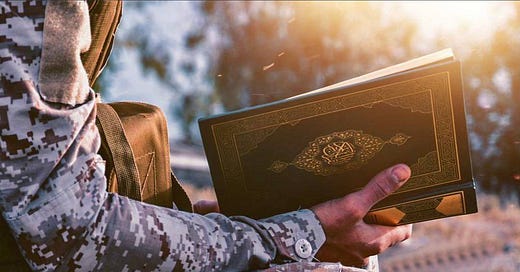Divine Strategy: The Prophetic Art of War and Reform
Weekly Generational Lessons from the Military and Political Genius of the Final Messenger ﷺ
Throughout history, great minds have tried to unlock the secrets of power, strategy, and victory. From Sun Tzu’s The Art of War to Robert Greene’s The 33 Strategies of War, these texts are studied in military academies and corporate boardrooms as timeless sources of tactical wisdom.
Yet, among all these theorists and tacticians, the Prophet Muhammad ﷺ stands alone, not merely as a strategist, but as a divinely guided Messenger of Allāh, reformer, statesman, and commander who united a fractured people and established a civilisation of Tawhīd [Monotheism], justice, and Islamic governance.
"Indeed, in the Messenger of Allāh you have an excellent example for whoever hopes in Allah and the Last Day and remembers Allāh often." (Qur’ān 33:21)
In this new series, titled Divine Strategy: The Prophetic Art of War and Reform, we will explore the battles and expeditions of the Prophet ﷺ, not as isolated stories of the past, but as a living blueprint for Islamic movements, reformers, and communities navigating oppression, disunity, and revival.
We will draw academic, spiritual, and strategic insights from a specific military event in the Sīrah, seeking to uncover how prophetic leadership reshaped the balance of power, and how it can guide us today.
Why Do We Study His Battles Today?
For many Muslims, the battles of the Prophet ﷺ are either ignored or simplified into tales of bravery and sacrifice. But these were not just wartime episodes, they were multi-dimensional campaigns that contained:
Political intelligence
Economic disruption
Tactical innovation
Spiritual strength
Civilisational planning
Media and counter propaganda
Alliance building and treaties
These campaigns were schools of statecraft, blueprints for movements, and above all, generational lessons on how to lead oppressed people from weakness to strength, from division to unity, from survival to revival.
“Each battle of the Prophet ﷺ offers generational guidance, not just how to fight, but how to think, strategise, and uplift an Ummah.”
What the Battles of the Prophet ﷺ Teach Future Generations
When we examine the military and political life of the Prophet ﷺ, we uncover lessons for every generation that go far beyond the battlefield:
Strategic Foresight: The Prophet ﷺ thought in decades. He analysed threats before they materialised. This teaches us to plan with clarity and patience.
Economic Warfare: He disrupted the Quraysh trade routes and formed alliances that economically weakened the enemy. No revival is complete without economic vision.
Political Diplomacy: From Hudaybīyyah to tribal pacts, the Prophet ﷺ navigated tribal politics and power with wisdom. He knew when to show strength and when to show restraint.
Spiritual Anchoring: Before every battle, there was purification, Du‘a, morale building, and unity. He taught that victory comes only from Allāh, not numbers or tactics.
Leadership Development: Every expedition trained future leaders, Zayd, Khālid, Usamah, Alī, and others were shaped on these journeys. Each campaign was a training ground for future generations.
What Is This Series About?
“Friday Strategy Nights” is a weekly series exploring the battles and expeditions of the Prophet Muhammad ﷺ, not just as historical events, but as generational textbooks of Islamic revival.
We will analyse each campaign through:
Historical and Sīrah-based sources: Every narration and report will be thoroughly researched and authenticated according to the assessments of the scholars of Hadith, ensuring our study is based on authentic and reliable texts.
Strategic objectives and geopolitical analysis: Exploring the broader political landscape and the Prophet’s ﷺ long-term vision.
Spiritual dimensions and community development: Understanding how faith, morale, and social unity supported each campaign.
Lessons for today’s Ummah: Practical insights for Da’wah, leadership, reform, and resistance in our contemporary context.
This rigorous approach guarantees that our insights are both spiritually sound and academically credible, honouring the Prophetic legacy with integrity.
Each lesson will be practical and academic, with the goal of reviving the forgotten curriculum of strategy in Islām.
For today’s Islamic movements, these events are not just history, they are a blueprint. The Ummah’s revival does not begin with slogans or protest alone. It begins with strategic vision, moral clarity, institution building, and a deep connection to the Prophetic methodology.
“These battles are not just about swords, they are about strategy, reform, spiritual preparation, and future-building. They are generational lessons encoded in the life of the Prophet ﷺ for a wounded Ummah to rise again.”
Ibrāhīm Hussain
Al-Harakah Research Team






